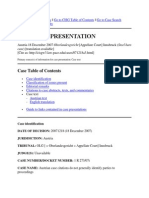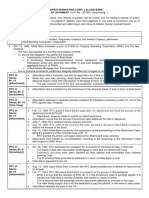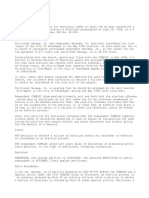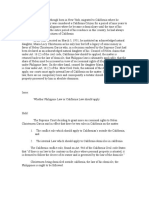0 ratings0% found this document useful (0 votes)
373 viewsBPI Vs CA Case Digest
BPI Vs CA Case Digest
Uploaded by
Ma Geobelyn Lopez1) An impostor impersonating Eligia Fernando succeeded in withdrawing money from BPI using forged checks. She deposited the checks into her account at China Banking Corporation (CBC).
2) Both BPI and CBC were found to be negligent in the selection and supervision of their employees. However, the Supreme Court ruled that BPI's negligence was the proximate cause of the payment of the forged checks since the fraud originated from their branch.
3) Considering the comparative negligence of both banks, the Supreme Court allocated the loss and arbitration costs between BPI and CBC at a 60% to 40% ratio, with no interest or attorney's fees awarded.
Copyright:
© All Rights Reserved
Available Formats
Download as DOC, PDF, TXT or read online from Scribd
BPI Vs CA Case Digest
BPI Vs CA Case Digest
Uploaded by
Ma Geobelyn Lopez0 ratings0% found this document useful (0 votes)
373 views2 pages1) An impostor impersonating Eligia Fernando succeeded in withdrawing money from BPI using forged checks. She deposited the checks into her account at China Banking Corporation (CBC).
2) Both BPI and CBC were found to be negligent in the selection and supervision of their employees. However, the Supreme Court ruled that BPI's negligence was the proximate cause of the payment of the forged checks since the fraud originated from their branch.
3) Considering the comparative negligence of both banks, the Supreme Court allocated the loss and arbitration costs between BPI and CBC at a 60% to 40% ratio, with no interest or attorney's fees awarded.
Original Description:
case digest bpi
Original Title
BPI vs CA Case Digest
Copyright
© © All Rights Reserved
Available Formats
DOC, PDF, TXT or read online from Scribd
Share this document
Did you find this document useful?
Is this content inappropriate?
1) An impostor impersonating Eligia Fernando succeeded in withdrawing money from BPI using forged checks. She deposited the checks into her account at China Banking Corporation (CBC).
2) Both BPI and CBC were found to be negligent in the selection and supervision of their employees. However, the Supreme Court ruled that BPI's negligence was the proximate cause of the payment of the forged checks since the fraud originated from their branch.
3) Considering the comparative negligence of both banks, the Supreme Court allocated the loss and arbitration costs between BPI and CBC at a 60% to 40% ratio, with no interest or attorney's fees awarded.
Copyright:
© All Rights Reserved
Available Formats
Download as DOC, PDF, TXT or read online from Scribd
Download as doc, pdf, or txt
0 ratings0% found this document useful (0 votes)
373 views2 pagesBPI Vs CA Case Digest
BPI Vs CA Case Digest
Uploaded by
Ma Geobelyn Lopez1) An impostor impersonating Eligia Fernando succeeded in withdrawing money from BPI using forged checks. She deposited the checks into her account at China Banking Corporation (CBC).
2) Both BPI and CBC were found to be negligent in the selection and supervision of their employees. However, the Supreme Court ruled that BPI's negligence was the proximate cause of the payment of the forged checks since the fraud originated from their branch.
3) Considering the comparative negligence of both banks, the Supreme Court allocated the loss and arbitration costs between BPI and CBC at a 60% to 40% ratio, with no interest or attorney's fees awarded.
Copyright:
© All Rights Reserved
Available Formats
Download as DOC, PDF, TXT or read online from Scribd
Download as doc, pdf, or txt
You are on page 1of 2
G.R. No.
102383 November 26, 1992
BANK OF THE PHILIPPINE ISLANS v!. THE HON. "O#RT OF APPEALS $SE%ENTH &#I"IAL', HON.
&#GE REGIONAL TRIAL "O#RT OF (AKATI, BRAN"H )9, "HINA BANKING "ORP., *+, PHILIPPINE
"LEARING HO#SE "ORPORATION
A certain Susan Lopez San Juan, with the connivance of some BPI employees, succeeded in impersonating Eligia
! "ernando! #he real "ernando is a #reasurer of Philippine American Life Insurance $ompany %Philamlife&
handling Philamlife's corporate money mar(et account and has a money mar(et placement as evidenced )y a
promissory note with a maturity date of *ovem)er ++, +,-+ and a maturity value of P.,/0.,./1!+,!
#he impostor called up BPI and arranged for the pretermination of the placement! Informed that the placement
would yield less than the maturity value )ecause of its pretermination, the caller insisted on the pretermination 2ust
the same and as(ed that two chec(s )e issued for the proceeds, one for P+,-33,333!33 and the second for the
)alance, and that the chec(s )e delivered to her office at Philamlife! But the caller later advised that a certain
4osemarie "ernando, her niece would pic( up the chec(s! #he dispatcher failed to get or to re5uire the surrender of
the promissory note evidencing the placement when the chec(s were claimed! #here is also no showing that Eligia
! "ernando's purported signature on the letter re5uesting the pretermination and the latter authorizing 4osemarie
"ernando to pic( up the two chec(s, )oth of which letters were presuma)ly handed to the dispatcher )y 4osemarie
"ernando, was compared or verified with Eligia ! "ernando's signature in BPI's file! #he niece 64osemarie
"ernando7 was also an impostor!
#he impostor applied at $B$'s 8ead 9ffice for the opening of a current account! #he following day, the woman
holding herself out as Eligia ! "ernando deposited the two chec(s in controversy with $urrent Account *o!
+.01+3:1! 8er endorsement on the two chec(s was found to conform with the depositor's specimen signature!
$B$'s guaranty of prior endorsements and;or lac( of endorsement was then stamped on the two chec(s, which
$B$ forthwith sent to clearing and which BPI cleared on the same day!
#wo days after, withdrawals )egan! 8owever, the )alance shown in the computerized teller terminal when a
withdrawal is serviced at the counter does not show the account's opening date, the amounts and dates of deposits
and withdrawals! #he last withdrawal on *ovem)er /, +,-+ left $urrent Account *o! .01+3:1 with a )alance of only
P<=+!0+!
>hen the he maturity date of the money mar(et placement with BPI came on *ovem)er ++, +,-+, the real Eligia !
"ernando went to BPI for the roll:over of her placement! She disclaimed having preterminated her placement on
9cto)er +., +,-+! She e?ecuted an affidavit stating that while she was the payee of the two chec(s in controversy,
she never received nor endorsed them and that her purported signature on the )ac( of the chec(s was not hers )ut
forged! BPI returned the two chec(s in controversy to $B$ for the reason @Payee's endorsement forged@! A ping:
pong started when $B$, in turn, returned the chec(s for reason @Beyond $learing #ime@!
#he Ar)itration $ommittee ruled in favor of petitioner BPI, ordering $hina Ban(ing $orporation to pay the former
the amount of P+,.30,03=!<- with interest thereon at +.A per annum from the date when P$8$, pursuant to its
procedure for compulsory ar)itration of the ping:pong chec(s under Stoc(holders' 4esolution *o! 0:-1 was
implemented, up to the date of actual payment!
#he Board of Birectors of the P$8$ reversed the Ar)itration $ommittee's decision in its 9rder and BPI is
sentenced to pay $B$ the sum of P+,.30,03=!<-! In view of the facts, no interest nor attorney's fees are awarded!
BPI shall also )ear =<A or P<,/1=!<3 and $B$, .<A or P+,-+.!<3 of the cost of the Ar)itration proceedings
amounting to P=,.<3!33!
#he trial court dismissed the petition )ut modified the order! #he petitioner BPI filed with S$ a petition for review
on certiorari under 4ule /< of the 4ules of $ourt, )ut it was referred to the $ourt of Appeals for proper determination
and disposition! #he appellate court affirmed the trial court's decision!
Issues: In the event that the payee's signature is forged, may the drawer;drawee )an( %in this case
BPI& claim reim)ursement from the collecting )an( C$B$D which earlier paid the proceeds of the chec(s after the
same chec(s were cleared )y petitioner BPI through the P$8$E
>ho )etween the parties should )ear the loss in the payment of the forged chec(sE
Held: Both )an(s were negligent in the selection and supervision of their employees resulting in the
encashment of the forged chec(s )y an impostor! It was the gross negligence of the employees of )oth )an(s which
resulted in the fraud and the su)se5uent loss!
Petitioner BPI theorizes that the *egotia)le Instruments Law, specifically Section .1 thereof is not applica)le in the
light of the a)solute lia)ility of the representing or collecting )an( as regards forged endorsements in consonance
with the clearing guarantee re5uirement imposed upon the presenting or collecting )an(s @as it is worded todayF!
But this theory of petitioner BPI is not in order! #he present case involves chec(s as defined )y and under the
coverage of the *egotia)le Instruments Law! T-ere *re ./o $2' 0*r.! o1 Se2.3o+ 23 o1 .-e Ne4o.3*b5e
I+!.r6me+.! L*/7 T-e 13r!. 0*r. !.*.e! .-e 4e+er*5 r65e /-35e .-e !e2o+, 0*r. !.*.e! .-e e82e0.3o+ .o .-e
4e+er*5 r65e. T-e 4e+er*5 r65e 3! .o .-e e11e2. .-*. * 1or4e, !34+*.6re 3! 9/-o55: 3+o0er*.3ve9, *+, 0*:me+.
m*,e 9.-ro64- or 6+,er !62- !34+*.6re9 3! 3+e11e2.6*5 or ,oe! +o. ,3!2-*r4e .-e 3+!.r6me+.. T-e e82e0.3o+
.o .-3! r65e 3! /-e+ .-e 0*r.: re5:3+4 3+ .-e 1or4er: 3! 90re256,e, 1rom !e..3+4 60 .-e 1or4er: or /*+. o1
*6.-or3.:. T-e S" re2o4+3;e, negligence of the party 3+vo<3+4 1or4er: *! *+ e82e0.3o+ .o .-e 4e+er*5 r65e!
#the payee's names in the two %.& su)2ect chec(s were forged! "ollowing the general rule, the chec(s are @wholly
inoperative@ and of no effect! 8owever, the underlying circumstances of the case show that the general rule on
forgery is not applica)le! #he records show that petitioner BPI as drawee )an( and respondent $B$ as
representing or collecting )an( were )oth negligent resulting in the encashment of the forged chec(s!
Ban(s handle daily transactions involving millions of pesos! By the very nature of their wor( the degree of
responsi)ility, care and trustworthiness e?pected of their employees and officials is far greater than those of
ordinary cler(s and employees! "or o)vious reasons, the )an(s are e?pected to e?ercise the highest degree of
diligence in the selection and supervision of their employees!
In the present case, there is no 5uestion that B9#8 )an(s were negligent in the selection and supervision of their
employees! #he Ar)itration $ommittee, the P$8$ Board of Birectors and the lower court, however disagree in the
evaluation of the degree of negligence of the )an(s!
#he S$ ruled that the issue as to whose negligence is graver is relevant! *o matter how many 2ustifications )oth
)an(s present to avoid responsi)ility, they cannot erase the fact that they were )oth guilty in not e?ercising
e?traordinary diligence in the selection and supervision of their employees! But on whose negligence was the
pro?imate cause of the payment of the forged chec(s )y an impostor!
Petitioner BPI insists that the doctrine of last clear chance enunciated in the case of Picart v! Smith%1= Phil! -3,
C+,+-D& should have )een applied considering the circumstances of the case! But thisis not well:ta(en! #he S$ is not
also persuaded )y the contention of BPI that even if the doctrine of pro?imate cause is applied, still, respondent
$B$ should )e held responsi)le for the payment to the impostor of the two %.& chec(s! Applying the doctrine of
pro?imate cause, petitioner BPI's contention that $B$ alone should )ear the loss must fail! It is
not unnatural or unexpected that after ta(ing the ris( of impersonating Eligia ! "ernando with the connivance of
BPI's employees, the impostor would complete her deception )y encashing the forged chec(s! #here is therefore,
greater reason to rule that the pro?imate cause of the payment of the forged chec(s )y an impostor was due to the
negligence of petitioner BPI!
$onsidering the comparative negligence of the two %.& )an(s, the S$ ruled that the demands of su)stantial 2ustice
are satisfied )y allocating the loss of P.,/+1,.+<!+0 and the costs of the ar)itration proceeding in the amount of
P=,.<3!33 and the cost of litigation on a 03:/3 ratio! $onforma)ly with this ruling, no interests and attorney's fees
can )e awarded to either of the parties!
Petitioner Ban( of the Philippine Islands shall )e responsi)le for si?ty percent %03A& while respondent $hina
Ban(ing $orporation shall share forty percent %/3A& of the loss and the ar)itration cost! #he Philippine $learing
8ouse $orporation is here)y directed to effect the corresponding entries to the )an(s' clearing accounts in
accordance with this decision! G
You might also like
- Innsbruck (Steel Bars Case)Document22 pagesInnsbruck (Steel Bars Case)Weng Santos100% (1)
- Calinog Vs Philippine National Bank (PNB) 51 OG 4104Document3 pagesCalinog Vs Philippine National Bank (PNB) 51 OG 4104Queenie BoadoNo ratings yet
- Hiligaynon DictionaryDocument539 pagesHiligaynon DictionaryMa Geobelyn Lopez67% (3)
- Hiligaynon DictionaryDocument539 pagesHiligaynon DictionaryMa Geobelyn Lopez67% (3)
- Hiligaynon DictionaryDocument539 pagesHiligaynon DictionaryMa Geobelyn Lopez67% (3)
- Molina Vs de La Riva 6 Phil 12 INOKDocument2 pagesMolina Vs de La Riva 6 Phil 12 INOKErick Jay InokNo ratings yet
- B-A-M-G-, AXXX XXX 558 (BIA Dec. 27, 2016)Document5 pagesB-A-M-G-, AXXX XXX 558 (BIA Dec. 27, 2016)Immigrant & Refugee Appellate Center, LLCNo ratings yet
- 10 Oropeza V Allied BankDocument4 pages10 Oropeza V Allied BankmeriiNo ratings yet
- Civil Law Review (Contracts Case Digest)Document3 pagesCivil Law Review (Contracts Case Digest)noorlaw100% (1)
- G.R. No. 211564 Benjamin Evangelista, Petitioner Screenex, INC., Represented by ALEXANDER G, YU, Respondent Decision Sereno, Cj.Document32 pagesG.R. No. 211564 Benjamin Evangelista, Petitioner Screenex, INC., Represented by ALEXANDER G, YU, Respondent Decision Sereno, Cj.Qwin DaleNo ratings yet
- Ledda V BpiDocument6 pagesLedda V BpiPaul de PhoenixNo ratings yet
- Enrico Eulogio V Spouses Clemente Apeles and Luz ApelesDocument1 pageEnrico Eulogio V Spouses Clemente Apeles and Luz ApelesKay AvilesNo ratings yet
- Negotiable Instruments Law Digests Section 1Document13 pagesNegotiable Instruments Law Digests Section 1Jay-ar Rivera BadulisNo ratings yet
- Sesbreno Vs CADocument1 pageSesbreno Vs CARhuejane Gay MaquilingNo ratings yet
- Dino v. CADocument4 pagesDino v. CAGennard Michael Angelo AngelesNo ratings yet
- Civil Procedure Case Digests (Rule 35)Document12 pagesCivil Procedure Case Digests (Rule 35)Maestro LazaroNo ratings yet
- Violag v. Ba FinanceDocument3 pagesViolag v. Ba FinanceRavenFoxNo ratings yet
- Associated Bank v. Tan - 446 SCRA 282Document5 pagesAssociated Bank v. Tan - 446 SCRA 282alilramonesNo ratings yet
- 12 Coolidge v. PaysonDocument2 pages12 Coolidge v. PaysonrNo ratings yet
- Trans-Pacific Industrial v. CADocument1 pageTrans-Pacific Industrial v. CAKimNo ratings yet
- Facts:: Metrobank v. CA, 194 SCRA 169Document7 pagesFacts:: Metrobank v. CA, 194 SCRA 169karlNo ratings yet
- Republic v. Philippine International Corp, 2017Document1 pageRepublic v. Philippine International Corp, 2017Rob GozunNo ratings yet
- Westmont Bank VS Dela Rosa-RamosDocument2 pagesWestmont Bank VS Dela Rosa-RamosCandelaria QuezonNo ratings yet
- Dilg Memorandum Circular 2022-132Document15 pagesDilg Memorandum Circular 2022-132DILG Labrador Municipal OfficeNo ratings yet
- Dino V Judal-LootDocument2 pagesDino V Judal-LootBeeya EchauzNo ratings yet
- Aguilar v. Lightbringers Credit CoopDocument4 pagesAguilar v. Lightbringers Credit CoopMac Burdeos CamposueloNo ratings yet
- Nego Case Digests - ForgeryDocument10 pagesNego Case Digests - ForgeryCates TorresNo ratings yet
- BPI vs. Intermediate Appellate Court GR# L-66826, August 19, 1988Document6 pagesBPI vs. Intermediate Appellate Court GR# L-66826, August 19, 1988Jolet Paulo Dela CruzNo ratings yet
- 5 - US vs. PAnaligan, 14 Phil 46Document1 page5 - US vs. PAnaligan, 14 Phil 46gerlie22No ratings yet
- Law On Business Organizations ReviewerDocument2 pagesLaw On Business Organizations ReviewerJuvyNo ratings yet
- Lanuza V. de Leon 20 SCRA 369 (1967)Document2 pagesLanuza V. de Leon 20 SCRA 369 (1967)CAJNo ratings yet
- Equitable Savings Vank V PalcesDocument2 pagesEquitable Savings Vank V PalcesRobert RosalesNo ratings yet
- Evelyn V. Ruiz vs. Bernardo F. DimailigDocument11 pagesEvelyn V. Ruiz vs. Bernardo F. DimailigTracey FraganteNo ratings yet
- Commercial ABCDocument92 pagesCommercial ABCDawn Juan CruzNo ratings yet
- Sps. Quirino v. Dela Cruz and Gloria Dela Cruz vs. Planters Products, Inc.Document2 pagesSps. Quirino v. Dela Cruz and Gloria Dela Cruz vs. Planters Products, Inc.Louie Marrero Dadat100% (1)
- DIZON V COURT OF TAX APPEALSDocument2 pagesDIZON V COURT OF TAX APPEALSbantucin davooNo ratings yet
- Producers Bank of The Philippines V CA Digest 2Document2 pagesProducers Bank of The Philippines V CA Digest 2Angel UrbanoNo ratings yet
- G.R. No. L-49188: 03. Philippine Airlines v. CA (1990)Document1 pageG.R. No. L-49188: 03. Philippine Airlines v. CA (1990)MichaelVillalonNo ratings yet
- NegoDocument30 pagesNegodollyccruzNo ratings yet
- Simple Loan or Mutuum: Quo Rendered A Decision Ordering The Appellant ToDocument109 pagesSimple Loan or Mutuum: Quo Rendered A Decision Ordering The Appellant ToDanielle LimNo ratings yet
- Metrobank vs. Court of AppealsDocument3 pagesMetrobank vs. Court of AppealsAlphaZuluNo ratings yet
- Void and Inexistent Contracts Final Compiled PDFDocument20 pagesVoid and Inexistent Contracts Final Compiled PDFJessie Daven Adrian GallardoNo ratings yet
- PNB Vs Manila OilDocument1 pagePNB Vs Manila OiljeninaaningNo ratings yet
- SECTION 1 - Effects of Guaranty Between The Guarantor and The Creditor (2058-2065)Document1 pageSECTION 1 - Effects of Guaranty Between The Guarantor and The Creditor (2058-2065)Anonymous U7Az3W8IANo ratings yet
- RFBT October 2022Document17 pagesRFBT October 2022yen claveNo ratings yet
- 01 Fidelity Savings V CenzonDocument2 pages01 Fidelity Savings V CenzonAnonymous AUdGvYNo ratings yet
- CD 122. Lozano v. Martinez, 146 SCRA 323 (1986)Document1 pageCD 122. Lozano v. Martinez, 146 SCRA 323 (1986)JMae MagatNo ratings yet
- Banaga Vs ComelecDocument2 pagesBanaga Vs ComelecAnonymous Yz5XZfNo ratings yet
- 11 11) Engr. Jose E. Cayanan North Star Int'l Travel, Inc., G.R. No. 172954 Oct. 5, 2011Document2 pages11 11) Engr. Jose E. Cayanan North Star Int'l Travel, Inc., G.R. No. 172954 Oct. 5, 2011AlexandraSoledadNo ratings yet
- PNB vs. Sps CheahDocument3 pagesPNB vs. Sps CheahShiela Pilar100% (1)
- Republic Vs de Guzman - DEL ROSARIODocument1 pageRepublic Vs de Guzman - DEL ROSARIOJohn L.No ratings yet
- G.R. No. 164051 Digested CaseDocument5 pagesG.R. No. 164051 Digested CaseAlheckzxsh DhannielNo ratings yet
- Country Bankers Insurance Corporation vs. Antonio LagmanDocument3 pagesCountry Bankers Insurance Corporation vs. Antonio LagmanRS SamillanoNo ratings yet
- DigestDocument12 pagesDigestAnna Marie DayanghirangNo ratings yet
- 10 Perez vs. Comparts IndustriesDocument1 page10 Perez vs. Comparts Industriesmei atienzaNo ratings yet
- Comelec Vs Cruz 605 SCRA 167 (2009)Document8 pagesComelec Vs Cruz 605 SCRA 167 (2009)Lu CasNo ratings yet
- Oriental Insurance vs. Manuel OngDocument3 pagesOriental Insurance vs. Manuel OngLeizandra PugongNo ratings yet
- Loreto D. de La Victoria V Hon. Jose P. Burgos G.R. No. 111190 June 27, 1995Document2 pagesLoreto D. de La Victoria V Hon. Jose P. Burgos G.R. No. 111190 June 27, 1995Angela Louise Sabaoan100% (1)
- Nego Elizalde Vs Binan TranspoDocument1 pageNego Elizalde Vs Binan TranspobernadetteNo ratings yet
- Taxation Garcia/Tamayo TX-602: Corporation (Income Tax Rates)Document2 pagesTaxation Garcia/Tamayo TX-602: Corporation (Income Tax Rates)Jun SaintNo ratings yet
- Pay Vs PalancaDocument2 pagesPay Vs PalancaGeorge AlmedaNo ratings yet
- National Steel Corporation vs. CA DigestDocument4 pagesNational Steel Corporation vs. CA DigestClaudine SumalinogNo ratings yet
- Civ2 Case 2Document2 pagesCiv2 Case 2Ren Irene D MacatangayNo ratings yet
- OC (48) Philippine National Bank v. Teves - CHINGDocument1 pageOC (48) Philippine National Bank v. Teves - CHINGachiNo ratings yet
- Ang Tek Lian Vs CA GR No. L-2516Document2 pagesAng Tek Lian Vs CA GR No. L-2516Kram Nuj Onitnelot OgnatNo ratings yet
- Pre Trial Brief2Document4 pagesPre Trial Brief2NaigAnipseNo ratings yet
- HelloDocument1 pageHelloMa Geobelyn LopezNo ratings yet
- The Many Benefits of Coconut Water KefirDocument3 pagesThe Many Benefits of Coconut Water KefirMa Geobelyn LopezNo ratings yet
- Sterling Vs LLDADocument1 pageSterling Vs LLDAMa Geobelyn LopezNo ratings yet
- RA 10066 Heritage LawDocument31 pagesRA 10066 Heritage LawMa Geobelyn LopezNo ratings yet
- Tawang Vs La TrinidadDocument1 pageTawang Vs La TrinidadMa Geobelyn LopezNo ratings yet
- Benefits of GUYABANODocument1 pageBenefits of GUYABANOMa Geobelyn LopezNo ratings yet
- Stages of Criminal ActionsDocument9 pagesStages of Criminal ActionshenzencameroNo ratings yet
- Tourism Investment ILoilo-GuimarasDocument71 pagesTourism Investment ILoilo-GuimarasMa Geobelyn LopezNo ratings yet
- (Disney's Frozen) Let It Go LyricsDocument2 pages(Disney's Frozen) Let It Go LyricsMa Geobelyn Lopez100% (1)
- Negotiable Instruments LawDocument13 pagesNegotiable Instruments LawMa Geobelyn LopezNo ratings yet
- Credit Midterm GuideDocument12 pagesCredit Midterm GuideMa Geobelyn LopezNo ratings yet
- Borbajo Vs Hidden View PDFDocument2 pagesBorbajo Vs Hidden View PDFMa Geobelyn Lopez100% (1)
- Equitable V RCBC ADR CaseDocument3 pagesEquitable V RCBC ADR CaseMa Geobelyn Lopez100% (2)
- Complainant'S Data: Republic of The Philippines Commission On Human RightsDocument4 pagesComplainant'S Data: Republic of The Philippines Commission On Human RightsMa Geobelyn LopezNo ratings yet
- Irr Gsis LawDocument46 pagesIrr Gsis LawMa Geobelyn LopezNo ratings yet
- Santiago V BautistaDocument3 pagesSantiago V BautistaCistron ExonNo ratings yet
- Financial Building Corp. vs. Forbes Park Association GR 133119Document11 pagesFinancial Building Corp. vs. Forbes Park Association GR 133119albemartNo ratings yet
- Anthony M. Crimaldi v. United States of America, United States Civil Service Commission and The Chief Executive Officer of The Postal Corporation, 651 F.2d 151, 2d Cir. (1981)Document4 pagesAnthony M. Crimaldi v. United States of America, United States Civil Service Commission and The Chief Executive Officer of The Postal Corporation, 651 F.2d 151, 2d Cir. (1981)Scribd Government DocsNo ratings yet
- Supreme Court: Romeo P. Pineda For Petitioners. Casiano C. Sabile For Private RespondentDocument8 pagesSupreme Court: Romeo P. Pineda For Petitioners. Casiano C. Sabile For Private RespondentJA BedrioNo ratings yet
- G.R. Nos3Document3 pagesG.R. Nos3JAMP Internet CafeNo ratings yet
- May Docket Il Supreme CourtDocument44 pagesMay Docket Il Supreme CourtJustice CaféNo ratings yet
- (HC) Bousamra vs. Sisto, Et Al - Document No. 4Document2 pages(HC) Bousamra vs. Sisto, Et Al - Document No. 4Justia.comNo ratings yet
- Cases-Batch 2 FULLDocument100 pagesCases-Batch 2 FULLMaria Zola Estela GeyrozagaNo ratings yet
- MPEP Chapter 1200 AppealsDocument72 pagesMPEP Chapter 1200 AppealsSam HanNo ratings yet
- Torbela vs. Rasario PDFDocument55 pagesTorbela vs. Rasario PDFral cbNo ratings yet
- Arpit EcoDocument26 pagesArpit EcoArpit GoyalNo ratings yet
- Sanchez Vs RigosDocument3 pagesSanchez Vs RigosPau JoyosaNo ratings yet
- REBUSQUILLO V. SPS. GALVEZ (June 4, 2014) FactsDocument5 pagesREBUSQUILLO V. SPS. GALVEZ (June 4, 2014) FactsJustine M.No ratings yet
- Family Courts (A Form of Arbitration)Document24 pagesFamily Courts (A Form of Arbitration)Manju DhruvNo ratings yet
- Caveat For NCLATDocument5 pagesCaveat For NCLATHoney Satpal0% (1)
- Application Form: Professional Regulation CommissionDocument1 pageApplication Form: Professional Regulation CommissionNorweena QuinonesNo ratings yet
- 4 Tupas V CADocument3 pages4 Tupas V CAJoshua Janine LugtuNo ratings yet
- Dolar v. Barangay LublubDocument11 pagesDolar v. Barangay LublubCzarina CidNo ratings yet
- Aznar Vs GarciaDocument3 pagesAznar Vs GarciaSugar Fructose GalactoseNo ratings yet
- Commentary - IBA Rules On The Taking of EvidenceDocument27 pagesCommentary - IBA Rules On The Taking of EvidenceVictor ZacariasNo ratings yet
- United States vs. Vicentillo. 19 Phil. 118, March 18, 1911Document3 pagesUnited States vs. Vicentillo. 19 Phil. 118, March 18, 1911Rodolfo TobiasNo ratings yet
- Moot Problem 015Document36 pagesMoot Problem 015Shubham0% (1)
- Vda de Camilo Vs Arcamo 3 Phil 146Document3 pagesVda de Camilo Vs Arcamo 3 Phil 146Tine TineNo ratings yet
- Position Paper - PlaintiffDocument11 pagesPosition Paper - PlaintiffJozele Dalupang100% (2)
- Customs 6 NotesDocument15 pagesCustoms 6 Notesarrah_100% (1)
- Aranda Vs CADocument3 pagesAranda Vs CAdayneblazeNo ratings yet
- Residual Jurisdiction ResearchDocument3 pagesResidual Jurisdiction ResearchkmoNo ratings yet









































































































